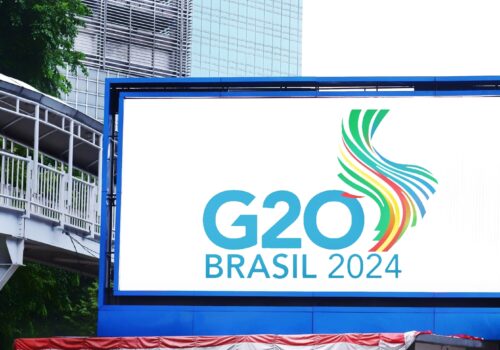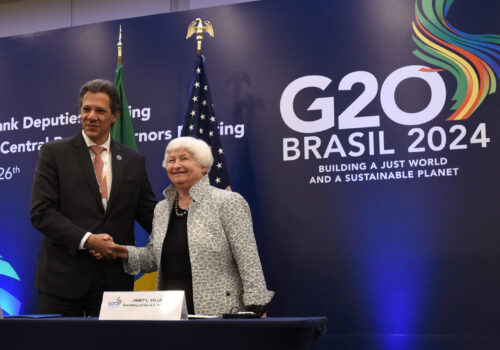Divided COP29 and G20 Summits: A taste of things to come
Weeks before taking office, President-elect Donald Trump’s views have already cast a long shadow over the twenty-ninth United Nations Climate Change Conference (COP29) in Baku, Azerbaijan, and the Group of Twenty (G20) Summit in Rio de Janeiro, Brazil. What’s happening in Baku and Rio foreshadows the treacherous arena for international cooperation in the next four years.
Underwhelming COP29
Participants at COP29 managed to reach an agreement on international carbon market standards, a key step to establishing such a market under the United Nations (UN), as envisioned in Article 6.4 of the 2015 Paris Agreement. However, COP29 became stuck on the key objective of the meeting: producing a new collective quantified goal (NCQG) as a new climate finance target for the next ten to fifteen years. This is meant to replace the current $100 billion annual figure—a pledge of financial aid to developing countries made by developed countries in 2009, but viewed as totally inadequate.
The most important issue to be settled is the quantum of the NCQG. Participating countries have disparate expectations, which are unlikely to be bridged. Developing countries have coalesced around the target of $1.3 trillion a year of international climate finance aid, based on a report by the High Level Expert Group on Climate Finance. Developed countries spearheaded by the European Union (EU) have reportedly toyed with a range of $200-300 billion, but are reportedly leaning toward $200 billion and a 2035 deadline.
The issue of the contributor base has also been important. Developing countries want to stick to the Paris Agreement, which calls for developed countries to provide climate finance to developing countries. Developed countries want to widen the contributor base to include rapidly growing emerging market countries. These countries, such as China and the Gulf countries, are able to contribute and should do so because of their high levels of emissions. Many developing countries, in particular China, have strongly objected to these demands. As part of the debate, China announced that it has voluntarily provided 177 billion yuan ($24 billion) in project financing to help other developing countries deal with climate change since 2016. This statement highlights China’s preferences for a bilateral approach. China is using climate finance as a tool to further its geopolitical agenda, instead of contributing funds to multilateral efforts. If other countries decide to follow a similar bilateral approach, they could strike another blow against the unraveling multilateral world order.
A day after the COP29 officially ended, an agreement on NCQG was reached, calling for developed countries to provide $300 billion a year by 2035 to help developing countries in their climate efforts. No one is happy with the agreement. Developing countries have criticized it as too little. Developed countries have tried to lower expectations about official aid, emphasizing that the funding would have to come from a wide variety of sources, including the private sector. In any event, the agreements concluded at the COP29 will be overshadowed by the fact that Trump would most likely pull the United States out of the 2015 Paris Agreement for a second time—and could even withdraw from the 1992 UN Treaty that provides the framework for the COP process. This time around, Argentina could follow suit and quit the Paris Agreement. President Milei already recalled his negotiators midway through the COP29 meetings. Without the US and possibly Argentina, the rest of the world would have to struggle to come up with meaningful nationally determined commitments to achieve net zero emissions and to mobilize climate finance to help developing countries. This outlook does not augur well for the COP30 to be hosted by Brazil in 2025.
A divided G20 Summit
The G20 Summit in Rio de Janeiro has been described by media reports as chaotic and divided. Nevertheless, it managed to produce a Leaders’ Declaration, even though the debate about wording was cut short by Brazil’s President Lula—leaving a bitter taste among Western leaders. The Declaration contains watered-down language on practically all agenda items. A major result is the Global Alliance Against Hunger and Poverty, Lula’s signature project, which gathered support and was launched.
However, the facade of cooperation has been rocked by Argentina’s statement that while Milei did not want to prevent other leaders from signing the declaration, he strongly criticized key elements of the agenda. His targets included anything to do with the UN 2030 Sustainable Development Goals and strengthening the role of governments in fighting global hunger (which according to Milei should be promoted by removing the involvement of governments). At the same time, Milei stressed that he would prioritize economic development over environmental protection, having dissolved Argentina’s Environment Ministry after taking office. These arguments are in line with Trump’s views. They will likely be advanced more forcefully in future G20 meetings, undermining the chance of agreements for joint actions and weakening the G20 itself.
Prospects for international cooperation: more turbulence
President Trump will likely reverse or ignore many of Biden’s environmental and climate change initiatives. However, as several red states have seen job creation thanks to IRA programs, he may continue some programs on a case-by-case basis. Overall, Trump’s approach would weaken environmental protection home and disengage from international climate efforts.
In the vacuum created by the United States and Argentina, China has already stepped in to champion international climate efforts under the Paris Agreement and open trade, as Xi Jinping claimed in his speech at the Rio G20 Summit. China has appealed to the EU to “collaborate effectively on the COP29 agenda…(to) establish a strong foundation for re-aligning their broad green and economic initiatives and improve their bilateral relationship.” China’s approach may appeal to the EU when it’s confronted with Trump’s denial of climate change and his protectionist unilateralism. However, if the EU were to cooperate with China on climate and trade issues, it would find itself at greater odds with a Trump administration already unhappy with the EU for free riding the US security umbrella while posting a trade surplus with the United States. The EU would be in a very difficult position, as it still very much depends on Washington for security, especially against a revanchist Russia emboldened by its successes in Ukraine.
The rest of the world can find ways to deal with climate change without the US federal government, as it did during Trump’s first presidential term—including working with US states and cities still keen to promote a green agenda. But the whole exercise would be inefficient and more difficult, especially when mobilizing climate finance.
As summarized by Bloomberg, the Rio G20 Summit has shown “how quickly the guardrails are coming off the international rule-based order…(as) the looming return of Trump hung over the proceedings like the proverbial sword of Damocles.” Expect more of the same, at future summits—starting with the 2025 G20 under the presidency of South Africa.
Hung Tran is a nonresident senior fellow at the Atlantic Council’s GeoEconomics Center, a former executive managing director at the Institute of International Finance and a former deputy director at the International Monetary Fund.

At the intersection of economics, finance, and foreign policy, the GeoEconomics Center is a translation hub with the goal of helping shape a better global economic future.
Further reading
Tue, Nov 12, 2024
Avoiding entanglement: G20 responses in a Taiwan crisis
Report By
This report identifies China’s likely goals for interactions with G20 nations under a Taiwan contingency, as well as each case country’s respective economic and policy reactions.
Fri, Apr 12, 2024
Brazil’s approach to the G20: Leading by example
Econographics By Hung Tran
Brazil’s non-aligned, cooperative, and practical approach holds out the promise of a constructive outcome for this year’s G20 meetings—especially if progress is measured by concrete global initiatives.
Tue, Jul 30, 2024
Dispatch from Rio: Can Brazil set up the G20 leaders’ summit for success?
New Atlanticist By Ananya Kumar, Mrugank Bhusari
Brasília has sought to acknowledge fundamental disagreements on geopolitics between some members, and then to sidestep them entirely at the ministerial level. How long can this approach last?


